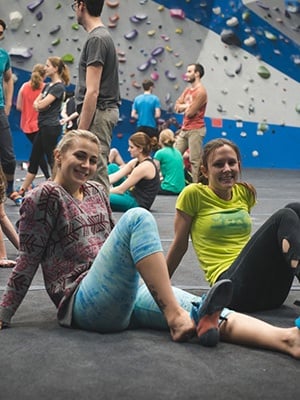The Sendy Times
Expand your climbing knowledge with training tips and tricks from Movement's instructors, trainers, and coaches.

Rock Climbing | Training for Climbing | Climbing Tips | bouldering
By: Kat Ku
What is a Spray Wall?

Rock Climbing | Climbing Community | Routesetting
By: Canon Huse
You might think route setting is just drilling plastic holds onto walls all day. And sure, that's technically part of it - but saying that's all there is to setting is like saying painting is just putting colors on canvas or cooking is just throwing ingredients in a pan.

Get the latest climbing news, tips and tricks straight to your inbox.

Rock Climbing | Climbing Community
By: Movement
Picture this — it's the last week of December. You're not sure what day it is, pie is becoming one of the major food groups, and it's day five of hosting the parents. Doesn't a gym session sound good right about now? Read on for the ultimate guide on bringing your family and friends along with you to Movement, whether you're traveling or hosting this holiday season!

Training for Climbing | Climbing Tips
By: Movement Staff
Fear is a natural response when climbing, whether you're scaling towering walls or tackling tricky boulders. It can keep you sharp, but it can also paralyze you if left unchecked. Managing fear is key to building confidence and finding joy in climbing, and one of the most effective tools you have is your breath. Here are some breathing techniques to help you stay calm and focused during your climbs.

Rock Climbing | Climbing Community | Climbing Tips | Climbing Gear | outdoor climbing
By: Hunter Price
In our gyms, everything is inspected regularly—bolts, anchors, quickdraws, you name it. But out at the crags, where there isn’t a Rockstar facilities team to back you up, it’s up to the climbing community to keep each other safe. At outdoor climbing areas, on public land, there is no routine maintenance or inspection by land management agencies, and all work is done by local volunteers. This means as climbers we are responsible for the bolts and anchors we choose to use! Thankfully, with the help of the American Safe Climbing Association (ASCA), caring for the crags you love has never been easier.

Women Rock Climbing | Climbing Community | What's New
By: Kat Ku
Here at Movement Fountain Valley, we're so psyched to introduce our new gym director team. We'd like you all to meet Tiff, who stepped into the Gym Director Role back in October, and Tara who became our Assistant Gym Director earlier this November. Together, they make up “TnT” — a powerhouse team dedicated to keeping the stoke alive and the community thriving. Tiff and Tara aren’t new faces around here. They’ve each been integral parts of the Movement family for years, bringing their passion for climbing and community to every aspect of what they do.

Climbing Tips | Fitness and Yoga
By: Amelia Gale
As the new year rapidly approaches, many people are starting to think of what they want to accomplish—whether it’s climbing a higher grade, overcoming a plateau, or improving nutrition. However, a common pitfall many people find themselves in is setting goals that are too unattainable. So how can you set goals that you can actually stick to? Here’s six tips to make sure your resolutions are both challenging and achievable.

Rock Climbing | Climbing Community
By: Rachel Osborne
Let's be real - there's a lot to love about climbing. As we head into the season of gratitude (and prime sending temperatures), here's a reminder of why we're thankful to be part of this chalk-dusted family:

Rock Climbing | Climbing Community
By: Movement
Ever wonder how your zodiac sign influences your climbing style? We’ve put together a fun climbing horoscope just for you. Find out what the stars say about your next send and discover tips tailored to your sign!

Rock Climbing | Climbing Community
By: Movement
Are you looking for the best climbing gyms in the Bay Area? With four unique locations—soon to be five—in San Francisco, Belmont, Sunnyvale, and Santa Clara, Movement Gyms provide world-class experiences for everyone, from first-time climbers to seasoned experts. Each gym offers a distinct combination of climbing terrain, fitness and yoga spaces, and a vibrant community atmosphere. Here are some of our favorite highlights from each location: